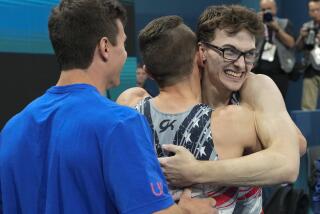COMMENTARY : Courage Begins at the Finish Line
People call Jack Clark a hero.
People call Magic Johnson a hero.
People call Joe Montana a hero.
And from the narrow perspective of the games people play, they are.
But in the game of life, the perspective broadens.
Jeremy Kahn is a hero.
So is Debra Yon.
Neither one of them will ever win a pennant with a home run, or a Super Bowl with a last-second pass.
Both of them are high school cross-country runners, Jeremy for Canoga Park, Debra for Birmingham. For that matter, neither of them may ever even win a race.
No matter. For them, the triumph is of the spirit.
To look for true courage on the athletic field, you don’t always have to follow the masses. Some of the biggest feats in sports don’t necessarily take place in front of 100,000 cheering fans, or 10 cameras shooting Slow-Mo and reverse angles.
Following complications at birth, Jeremy was diagnosed as having cerebral palsy, a disorder of the central nervous system resulting from a lack of oxygen to the brain. He also suffers from scoliosis, lateral curvature of the spine. Debra was born deaf.
By the time Jeremy was 18 months old, he still wasn’t rolling over the way babies that age normally do. In his particular case, the cerebral palsy affected the right side of his body. Specifically, his right hand and leg.
When Jeremy started to walk, he would throw his right leg out. He had no balance. He was born right-handed, but had to become a lefty because of limited use of the right hand. He had problems with his hand-eye coordination.
He underwent therapy, but doctors told his parents Jeremy could be mentally retarded.
They were wrong.
They said he would never ride a bike.
Wrong again.
Sports seemed just a futile dream. But sometimes dreams can be more powerful than reality.
The bike was easy. Jeremy conquered that two years ago. Sports took a little longer. The kid who once couldn’t walk straight decided he wanted to be a runner.
So his parents signed him up for the West Valley Eagles youth track team when he was 11 1/2. He ran in the 100- and 200-meter races.
Now 14, Jeremy, in his first year at Canoga Park, is a member of the freshman cross country team. He covered a three-mile course in 25:05 in his first race and bettered that Thursday with a time of 24:55, placing him third on his squad.
“He does everything all the other kids do,” Jim Rose, his coach, said. “His overall skill is not as high as some of the other runners but his competitive level is certainly as high. He does the very best he can. You can’t ask for more than that. There are a lot of kids out here who are real heroes. We have a kid who is asthmatic on the cross-country team. There is a deaf girl. There is a kid on the wrestling team who is educable mentally retarded. There are kids in wheelchairs who help out as managers.
“But you know, we are all handicapped in one way or another, even if it’s not physical. Some have family problems, some marriage problems. These kids just deal with something more visible.”
These are not simply the words of a sympathetic observer. Rose is actively involved as a teacher of special education for the handicapped.
“Jeremy is to be complimented,” Rose said. “To be a cross-country runner, you have to be dedicated. He is.
“The whole thing does not have to do with winning and losing. It has to do with finishing. What you have to do is to set goals for yourself and the goals he has set for himself are realistic. This year and the next few years, he’s going to get better and, hopefully, his times are going to get better. He’s in competition with only one other person, himself. In that regard, he’s found some success. It’s an individual battle he’s fighting and it’s nice to see.”
In sports, we tend to toss around the word “hero” a little too freely. Webster defines one as “any man admired for his qualities or achievements and regarded as an ideal or a model.”
Birmingham cross-country Co-coach Pat Connelly calls Debra Yon a role model for the other kids on the team.
This is the first year at the Valley school for the 17-year-old Yon, who transferred to Birmingham from a school for the deaf in Los Angeles. The first few weeks indicate the move was a wise one. Connelly has learned to adjust to his runner’s special needs, working out hand signals to communicate. The result is a series of performances that has placed Yon among the top five runners on the team, a team expected to be good enough to challenge for the league championship.
Having achieved one goal, Yon is pointing her toes in a new direction--towards the 1989 Deaf Games in New Zealand.
So who are the true heroes, a Jack Clark using his natural talent to earn a lucrative paycheck, or a Jeremy Kahn and a Debra Yon, stretching their natural talents to unexpected lengths to earn some self-respect?
Jeremy and Debra, this vote’s for you.
More to Read
Go beyond the scoreboard
Get the latest on L.A.'s teams in the daily Sports Report newsletter.
You may occasionally receive promotional content from the Los Angeles Times.










